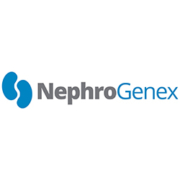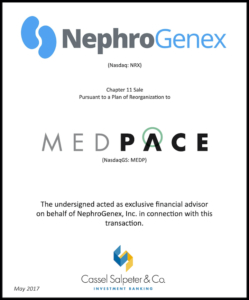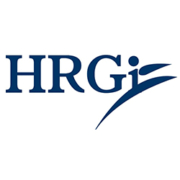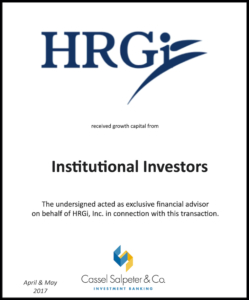Acquisition brings $15.2 million CPRIT grant to fund 70-patient Phase I trial
DURHAM, N.C., March 08, 2017 (GLOBE NEWSWIRE) — Heat Biologics, Inc. (“Heat”) (Nasdaq:HTBX), a leader in the development of immunotherapies designed to activate a patient’s immune system against cancer, announced that the company has entered into a definitive agreement with the holders of 75.5% of the outstanding capital stock of Pelican Therapeutics, Inc. (“Pelican”) to acquire an 80% controlling interest in Pelican. Headquartered in Austin, Texas, Pelican is a privately held immuno-oncology company focused on developing agonists to TNFRSF25, a highly differentiated and potentially “best-in-class” T cell costimulatory receptor.
Key highlights include:
- Pelican was the recipient of a highly competitive $15.2 million New Company Product Development Award from the Cancer Prevention and Research Institute of Texas (CPRIT), which should enable the company to advance multiple products through preclinical development and at least one program through a 70-patient Phase 1 clinical trial. The CPRIT grant is subject to customary CPRIT funding conditions and was awarded in 2016 following a rigorous scientific and clinical evaluation process.
- Pelican’s T cell costimulator, PTX-25, in combination with other immunotherapies, including Heat’s ImPACT and ComPACT technologies, has the potential to enhance durability of responses due to its preferential specificity to ‘memory’ CD8+ T cells.
- Preclinical studies demonstrate PTX-25 has superior “best-in-class” costimulatory activity for CD8+ cytotoxic T cells as compared to other costimulators.
“The acquisition of Pelican aligns with our strategic focus targeting exciting immuno-oncology combinations, strengthening Heat’s portfolio in the emerging T cell activation space,” said Jeff Wolf, Heat’s Founder and Chief Executive Officer. “Pelican’s two product candidates are transformative assets for us as there are compelling data indicating that targeting TNFRSF25 may have significant advantages over competing costimulatory receptors currently under development. This is important because many of the leading global pharmaceutical companies are focused on T cell costimulators to enhance the effectiveness of their existing immuno-oncology therapies.”
“Pelican’s PTX-25 has the potential to dramatically improve the durability of antigen-specific immune responses due to its preferential specificity for stimulating the production of ‘memory’ CD8+ T cells,” added Jeff Hutchins, Ph.D., Heat’s Chief Scientific Officer and Senior Vice President of Preclinical Development. “We look forward to advancing these new product candidates with synergistic combinations including Heat’s existing T cell-activating platform technologies, ImPACT and ComPACT, vastly expanding our reach within oncology and possibly beyond.”
The acquisition is contingent upon certain closing conditions, including agreements of the holders of 80% of the outstanding capital stock of Pelican, on a fully diluted basis, to participate in the acquisition and enter into a stockholders agreement with respect to their remaining Pelican shares. As consideration for the sale of 80% of the Pelican Stock, Heat will pay the Pelican stockholders that participate in the acquisition an upfront cash payment not to exceed $500,000 and will issue an aggregate of 1,323,021 shares of Heat common stock, representing 4.99% of the outstanding shares of Heat common stock. In addition, Heat will cause Pelican to pay certain clinical and commercialization milestone payments, royalty and sublicensing income payments, and Heat will loan Pelican amounts sufficient to pay Pelican’s transaction expenses. Cassel Salpeter & Co. served as financial advisor to the Heat special committee and Geller Biopharm served as financial advisor to the Pelican special committee and Pelican stockholders.
The acquisition is expected to close no later than April 30, 2017, subject to applicable regulatory approvals and other customary terms and conditions.
About Pelican Therapeutics, Inc.
Pelican Therapeutics, Inc. is a privately held immuno-oncology company focused on developing agonists to TNFRSF25, a differentiated and potentially “best-in-class” T cell costimulatory receptor. TNFRSF25 has shown great promise due to its preferential specificity for stimulating the production of “memory” CD8+ T cells, the strongest predictive biomarker of clinical benefit from cancer immunotherapy. T cell costimulatory therapy, when combined with checkpoint inhibitors and other treatments, could significantly improve clinical responses for a broader range of patients. Pelican has conducted extensive preclinical studies and completed humanization of its lead monoclonal antibody, PTX-25.
About the Cancer Prevention and Research Institute of Texas (CPRIT)
Beginning operations in 2009, CPRIT has to-date awarded $1.78 billion in grants to Texas researchers, institutions and organizations. CPRIT provides funding through its academic research, prevention, and product development research programs. Programs made possible with CPRIT funding have reached all 254 counties of the state, brought more than 123 distinguished researchers to Texas, advanced scientific and clinical knowledge, and provided more than three million life-saving education, training, prevention and early detection services to Texans. Learn more at www.cprit.texas.gov.
About Heat Biologics, Inc.
Heat Biologics, Inc. (Nasdaq:HTBX) is an immuno-oncology company developing novel therapies that are designed to activate a patient’s immune system against cancer utilizing an engineered form of gp96, a protein that activates the immune system when cells die. Heat’s highly specific T cell-stimulating therapeutic vaccine platform technologies, ImPACT and ComPACT, in combination with other therapies, such as checkpoint inhibitors, are designed to address three distinct but synergistic mechanisms of action: robust activation of CD8+ “killer” T cells (one of the human immune system’s most potent weapons against cancer); reversal of tumor-induced immune suppression; and T cell co-stimulation to further enhance patients’ immune response. Currently, Heat is conducting a Phase 1b trial with HS-110 (viagenpumatucel-L) in combination with an anti-PD-1 checkpoint inhibitor to treat patients with non-small cell lung cancer (NSCLC) and a Phase 2 trial with HS-410 (vesigenurtacel-L) in patients with non-muscle invasive bladder cancer (NMIBC).
Heat’s wholly-owned subsidiary, Zolovax, Inc., is developing therapeutic and preventative vaccines to treat infectious diseases based on Heat’s gp96 vaccine technology, with a current focus on the development of a Zika vaccine in conjunction with the University of Miami.
For more information, please visit www.heatbio.com.
Forward Looking Statements
This press release includes forward-looking statements within the meaning of the Private Securities Litigation Reform Act of 1995 on our current expectations and projections about future events. In some cases, forward-looking statements can be identified by terminology such as “may,” “should,” “potential,” “continue,” “expects,” “anticipates,” “intends,” “plans,” “believes,” “estimates,” and similar expressions. These statements are based upon current beliefs, expectations and assumptions and include statements regarding the ability of the parties to satisfy all closing conditions and consummate the Pelican transaction, and to develop Pelican’s potential products singly or in combinations with Heat’s existing product portfolio, the advantages that TNFRSF25 may have over competing costimulatory receptors currently under development, the potential of PTX-25, to enhance durability of responses due to its preferential specificity to ‘memory’ CD8+ T cells, the availability of the CPRIT grant and the potential of Heat’s ImPACT and ComPACT therapies. These statements are based on management’s expectations and assumptions as of the date of this press release and are subject to a number of risks and uncertainties, many of which are difficult to predict that could cause actual results to differ materially from current expectations and assumptions from those set forth or implied by any forward-looking statements, including the ability of Heat to consummate the Pelican transaction and develop its product candidates and prove them safe and efficacious, as well as results that are consistent with prior results, the ability to enroll patients and complete the clinical trials on time and achieve desired results and benefits, the company’s ability to obtain regulatory approvals for commercialization of product candidates or to comply with ongoing regulatory requirements, regulatory limitations relating to the company’s ability to promote or commercialize its product candidates for specific indications, acceptance of its product candidates in the marketplace and the successful development, marketing or sale of products, the company’s ability to maintain its license agreements, the continued maintenance and growth of its patent estate, its ability to establish and maintain collaborations, its ability to obtain or maintain the capital or grants necessary to fund its research and development activities, and its ability to retain its key scientists or management personnel and the other factors described in the company’s annual report on Form 10-K for the year ended December 31, 2015 and other filings with the SEC. The information in this release is provided only as of the date of this release and the company undertakes no obligation to update any forward-looking statements contained in this release based on new information, future events, or otherwise, except as required by law.
 No matter where you stand on political issues, it is important to recognize that the current administration’s actions and proposed deportation of millions of undocumented immigrants and reduction of available visas will have serious, unintended negative consequences for our economy and possibly your business. Middle-market business owners should understand the potential impacts on their businesses and take necessary steps to prepare.
No matter where you stand on political issues, it is important to recognize that the current administration’s actions and proposed deportation of millions of undocumented immigrants and reduction of available visas will have serious, unintended negative consequences for our economy and possibly your business. Middle-market business owners should understand the potential impacts on their businesses and take necessary steps to prepare.







